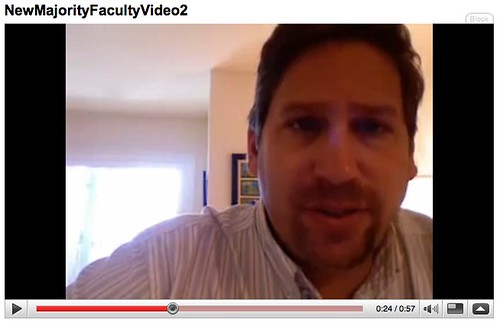Dear Dr. Biden,
The members of the Part Time Faculty Committee of the California Federation of Teachers represents many of the 45,000 part time and non-tenure track faculty throughout our state. Nationally, 70-80% of community college faculty are part time or non-tenure track. At four year schools, 25-35% are non-tenure track.
In your speech at UNESCO 2009 World Conference on Higher Educatin, you said you were "grateful for the opportunity to spread the word about the valuable contribution community colleges make in the United States." We hope you will be equally eager to help end the economic abuse of those adjunct faculty who dedicate their careers to teaching in community colleges.
As a part time faculty member yourself, you have no doubt seen for yourself the economic abuse of part time and an non-tenure track faculty. In some districts, we earn as little as 25% as much per class as our full time tenure track colleagues, are often denied health insurance or other benefits, and rarely have any job security. Here in California, community college part time faculty have to drive long distances to patch together jobs in multiple districts to earn a living.
Instructors wh have to run from one campus to another to make enough money to survive are going to be less available to their students outside of class, no matter what their good intentions.
No one who enters education expects to get rich in the teaching profession, but is it too much to ask that those who teach college, a job that requires a masters degree or Ph.D., at least get the same job security and benefits as those who teach K-12? And when we do choose to teach part time, shouldn't there be ONE pay scale since we are required to have the same qualifications as our full time colleagues?
What are we teaching our students about the value of higher education when those who make a career of providing it struggle to make a living?
We have tried to reform this unfair system for decades, but now we are in a unique point in history with a Democratic President and Congress, and reforming mood in the country, as President Obama has shown with his recent community college initiative. At the same time, those schools need a firm hand to prevent new funding from going to administrative bloat and six figure salaries for managers while those who actually teach are denied a living wage, health care, and academic freedom through job security.
Your stature as a public figure and status as a part time instructor could attract much needed attention and help prod change if you were to advocate on our behalf.
Therefore, we would like to request your support in promoting national legislation requiring the following:
- Every college or university have at least three-fourths of their faculty members be full time, tenure track employees.
- Part-time faculty get the same pay per class as their full-time peers if they have achieved the same qualifications and length of service.
- Part-time, nontenure-track faculty be granted proportionate benefits compared to their full-time, tenure-track peers.
If our country truly values education, it cannot continue to treat those who dedicate their lives to delivering it as second class citizens.
- At universities, a tenure track should exist for teaching faculty, not just research faculty.
Sincerely,
Phyllis Eckler, Chair
Part-Time Committee
California Federation of Teachers
We are still hoping for a reply.
In the meantime, if you're an adjunct yourself or sympathetic to our cause, you could contact your senators and congressman and ask them for at least those four points in it as part of an amendment to the Student Aid and Fiscal Responsibility Act of 2009.
You could also write Dr. Biden yourself and tell her what your life as an adjunct has been like at:
Jill Biden
The White House
1600 Pennsylvania Avenue NW
Washington, DC 20500
NOTE: The AFT FACE webpage has also posted an article on the Biden letter.
 |  |  |  |  |






